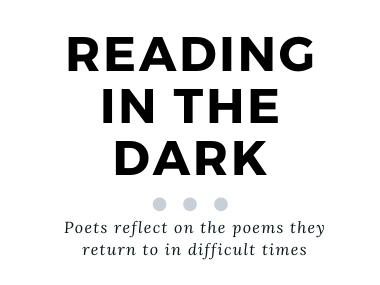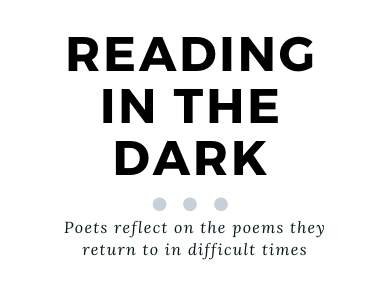Reading in the Dark
Sophie Cabot Black on Mark Strand’s “Black Sea”

Black Sea
One clear night while the others slept, I climbed
the stairs to the roof of the house and under a sky
strewn with stars I gazed at the sea, at the spread of it,
the rolling crests of it raked by the wind, becoming
like bits of lace tossed in the air. I stood in the long,
whispering night, waiting for something, a sign, the approach
of a distant light, and I imagined you coming closer,
the dark waves of your hair mingling with the sea,
and the dark became desire, and desire the arriving light.
The nearness, the momentary warmth of you as I stood
on that lonely height watching the slow swells of the sea
break on the shore and turn briefly into glass and disappear . . .
Why did I believe you would come out of nowhere? Why with all
that the world offers would you come only because I was here?
From Collected Poems by Mark Strand. (Knopf, 2014). Copyright © 2014 by Mark Strand. Reprinted with the permission of Alfred A. Knopf, a division of Penguin Random House LLC. Reprinted with the permission of the publisher.
In response to the Coronavirus pandemic, we asked poets to write about the poems they return to in difficult times—to find solace, perspective, or even a moment of delight. Subscribe to the PSA newsletter for more Reading In The Dark responses and to keep updated with the PSA.
What we turn to in these never-before and ever-shifting times, may or may not last. When we go back to the poems that have kept us awake to what we needed to remember, to see if they still hold, what we believe we need does not always work. The sad but good news is that we move on. Some poems stay by your side, some do not. Mark Strand for me is someone who in the simplest way asks the heart to hold both the dark and the light, as, after all, you cannot know one without the other.
"Black Sea," one of Strand’s later poems, has the bones of this working throughout its almost-sonnet form; beginning with the poet self-positing, a climb in order to see, to “gaze” at what spreads while “the others slept." How this resonates with our current impulse to climb out to where we can see where we are, where we head. Of course, the answer is not an answer, but more waiting, more doubt; the sonnet turns its turn (with a “you” having finally entered the frame through the speaker’s imagination) followed by a hint of palindrome in the ninth line (“and the dark becomes desire, and desire the arriving light”) deftly shifting us into the last third of the poem, where the “you” perhaps becomes a “You," which leads to the final couplet as one that rubs against itself, its dialectic.
In those last lines, I like to imagine Strand back in his childhood (this poem’s from his last decade), as the ask and the accusation roll into one, harsh with its mark of the question, and torn with all the world’s distractions against the weight of “come only because I was here."
—Sophie Cabot Black
Sophie Cabot Black is the author of several books of poetry, most recently The Exchange. She has been awarded numerous fellowships, including at the MacDowell Colony, the Fine Arts Center in Provincetown, and the Radcliffe Institute.

